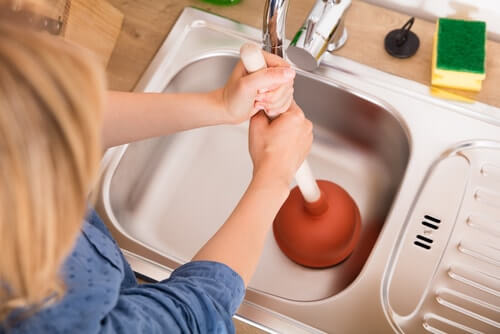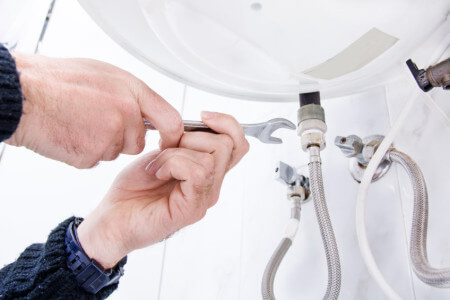They are making a number of good pointers regarding What to Do While Waiting for an Emergency Plumber as a whole in this post which follows.

Plumbing emergency situations can strike at any moment, causing stress and prospective damage to your home. Whether it's a ruptured pipe, a clogged up drain, or a leaky tap, understanding how to take care of the circumstance until a specialist plumbing gets here can conserve you from further difficulties. This short article provides necessary emergency pipes suggestions to aid you alleviate damage and gain back control during a pipes crisis.
Switch off the Supply Of Water
The first step in any type of plumbing emergency situation is to shut off the water system. For localized problems, such as a leaking tap or toilet, shut off the shutoff near the fixture. When it comes to a major leakage or burst pipeline, locate your home's primary water shut-off shutoff and turn it off quickly. Understanding the area of these valves ahead of time can save useful time throughout an emergency.
Shut down Your Water Heater
In particular emergencies, such as a burst pipeline, it's wise to turn off your hot water heater. This avoids getting too hot or damage to the system when water quits flowing. Shut off the power supply to the hot water heater (electric or gas) and let it cool to avoid prospective dangers.
Temporarily Stop a Ruptured Pipeline
A burst pipe can result in considerable water damages in minutes. To reduce the concern:
Call a specialist plumber right away to attend to the trouble permanently.
Have an Emergency Plumbing Set
Prepare a fundamental pipes emergency situation package to handle minor concerns properly. Your kit should include:
Having these devices on hand can make a significant difference in your ability to manage emergencies.
Unclog Drains Securely.
A clogged up drainpipe can be an irritating and untidy problem. Here's how to tackle it:.
If these methods do not function, avoid making use of too much force, as it may get worse the obstruction.
Manage Overflowing Toilets.
An overruning bathroom can cause instant chaos. Here's what you need to do:.
Address Small Leakages with Short-term Solutions.
Tiny leakages can quickly come to be considerable problems if left uncontrolled. Utilize these temporary solutions until specialist assistance arrives:.
While these solutions aren't permanent, they can help minimize water loss and damage.
Handle Frozen Water Lines Carefully.
In chillier environments, frozen pipelines are a common emergency situation. If you suspect a frozen pipeline:.
Know When to Call an Expert.
While quick fixes can aid temporarily, specific pipes issues require instant specialist attention. Call a plumbing technician if:.
Quickly calling a specialist ensures the problem is solved appropriately and prevents further problems.
Stop More Damages.
Taking fast action to minimize damage can save you time and money in the future. Right here's exactly how:.
Verdict.
Pipes emergency situations can be frustrating, however with the best knowledge and tools, you can manage the situation effectively until help gets here. By switching off the water, resolving tiny leakages, and making use of momentary repairs, you can reduce damage and keep your home safe. Remember, these tips are short-lived remedies; constantly seek advice from a certified plumbing to deal with the root cause of the trouble. Prep work and quick thinking are your ideal allies in any kind of plumbing emergency.
8 Helpful Tips for Managing Plumbing Emergencies at Home
If your plumbing system hasn’t failed once, wait for it because almost everyone has a story to tell. Sometimes, it could be simple emergencies such as a leaking pipe, a blocked cistern, or even a big burst pipe. In situations like this, you need to have some handy tips to save you some money and from possible damages.
Take care of minor issues early.
Sometimes, you could have avoided an emergency by taking proactive measures while it was still early. Some major plumbing emergencies can be a result of an ignored minor issue. We recommend that you have items like plumbing tapes and other related items. A plumbing tape can allow you to manage minor leaks before the plumber arrives.
Cut off the water supply.
This tip is essential in almost any type of leakage problem. For problems like minor leakages in the toilet or kitchen, turn off the supply that takes water to the affected pipes. If the leakage is a major pipe, you must shut off the supply valve to the entire building. This will help you avoid flooding your home and neighbors if you share a flat.
Know your plumbing system
Folks typically move into a new apartment without understanding the water supply around the building. This can prove disastrous if a water emergency arises and the plumber is far away. The previous tip will prove useless if you don’t practice this one. More importantly, know where your water shut-off valve is located – you’ll need that knowledge to prevent potential home floods.
Have some common handy tools
There are lots of plumbing emergencies that you can handle without hiring a plumber. That’s why you must keep some tools available always. Some tools that you can use to fix simple plumbing emergencies easily include plumbing tapes, screwdrivers, thread seal tapes, plungers, pliers, tape measures, and rubber gloves.
Insulate your pipes from cold
You’ll save yourself from many plumbing expenses if you protect your water pipes from the cold. This is because of the harmful effects that cold weather can have on your pipes. During winter, your pipes can burst from being overly expected to freezing temperatures. So, make sure insulators are there to keep the pipes working correctly.
Avoid practices that will clog your toilet.
Many people indulge in practices that can damage the plumbing system of the entire building. One of these is when they use their toilet to dispose-off garbage. They flush all kinds of things, such as paper towels, bandages, hairs, female sanitary products, etc., down the toilet. This will block your toilet in the long run, incurring unnecessary expenditures. Dump such waste in the trash instead.
Check your dials regularly.
Sometimes, there could be leakages in your home without noticing them in time. So, constantly monitor your water meter dial. If the dial is reading when there is nobody using water, this is an indicator that there is leaking. Check for leaks immediately. Call a plumber as soon as possible if you can’t find any.
https://www.constructionplacements.com/8-helpful-tips-for-managing-plumbing-emergencies-at-home/

I hope you enjoyed reading our piece on Plumbing Emergencies: Tips on What To Do Before. Thanks a lot for taking a few minutes to browse our piece of content. Sharing is good. You just don't know, you may just be doing someone a favor. We value reading our article about What to Do During a Plumbing Emergency.
Call Today